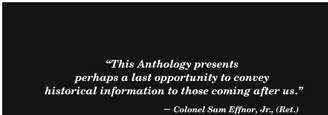 |
 |
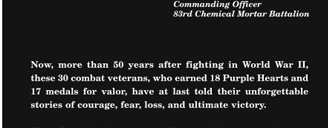 |
 |
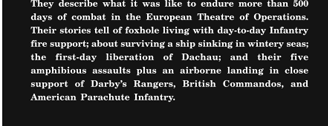 |
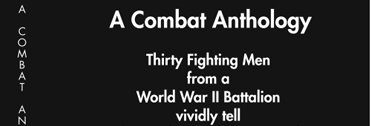 |
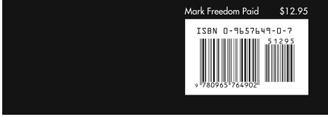 |
 |
Mark Freedom Paid
A Combat Anthology
edited by Lee Steedle
illustrated by Sam Kweskin
Mark Freedom Paid is a collection of 124 stories from 30 veterans of the 83rd Chemical Mortar Battalion with many sketches by the unit's artist. One of the accounts is presented below with permission of the publisher, the 83rd Chemical Mortar Battalion Veterans Association. To purchase the book, send a check for $15, made payable to “83rd CMB,” to Bill Hoover, 53 Camp Ave, Darien, CT 06820. He can also be contacted by phone at 203-595-9325 or by e-mail at Bhoover@optonline.net.
Allied forces invaded the Italian mainland on 9 September 1943 and the 83rd Cml Mortar Bn was part of the operation. Co D of the battalion landed at Vietri-sul-Mare in support of the 41st Royal Marine Commandos. Staff Sergeant Wofford L. (“Woof-Woof”) Jackson was a platoon sergeant in Co D at the time, having entered the service in September 1942 and joined the 83rd in October 1942. This is his story about the invasion and succeeding days as he lived them.
We landed north of the main invasion force 30 minutes before H-Hour with the 41st Royal Marine Commandos. Their commanding officer was “Mad Jack” Churchill, the son of Winston. As we arrived off the coast, we were attacked by air but our anti-aircraft gunners did a good job of driving the planes off. Down below deck it sounded like all hell was breaking loose. I had to go to the toilet every few minutes. After a while I decided, what the hell am I keeping these pants dry for? They will get wet when they sink us anyway.
Pat Renfroe had a World War I trench knife. It was a dagger on brass knuckles. I tried to buy it from him but he wouldn't sell. During the worst noise overhead he came over to my bunk and said: “Jackson, you always wanted this knife – here, you can have it!”
We made the landing in a small village, Vietri-sul-Mare. It was no small feat getting heavy mortar carts down the ramp of our LCI. We immediately made for high ground and ran smack into a German tank with the motor running. The crew inside must have been drunk or asleep. We were single file pulling mortar carts and they could have wiped us all out with just a few shots. A commando walked up to it and dropped a grenade in. No Germans came out. The tank blew up for 30 minutes. By daylight I had already liberated several bottles of Marsala and made friends with several Italian civilians.
We emplaced in the middle of town where we had to fire in all directions except toward the sea. We were also receiving fire of all kinds from all of these directions.
Vietri is at the south end of the Amalfi Drive. We had casualties every day. Some mortar crews actually operated with only two men. Three-man crews were about what most squads had left.
One day Sergeant James Lauro (who later got a battlefield commission to second lieutenant) was directing fire onto two tanks that were attacking us from the south. One German shell made a direct hit on a commando there with him. It blew blood, guts and everything else all over Lauro. The only thing it did to him, it blew the end of his trigger finger off. Lauro was an atheist. I asked him if he prayed. He said, “There is no god.” I said, “Yes there is, and He's trying to tell you something!”
Some of the commandos had goatees. A few of our men started growing them too. One of the best was on PFC Gulley. His name is not on our fatality list but should be. His head was blown off down to his lower lip and goatee. When the sun came up the next morning, there wasn't a goatee in sight. Sergeant Codega had grown a nice one and it was gone too.
One boy who was dead didn't have a wound mark on him. One man still standing with his guts hanging out was saying over and over, “I'm too young to die.” When he fell, he did.
One night the first platoon, led by Lieutenants Miller and Beasly, came by our position. They said an Italian had told them there were some Germans up the road who wanted to surrender. But we knew there was a machine gun up there that we never could knock out. The officers were smart enough to hold their platoon back while they themselves tackled the Germans. They contacted them all right. Our officers’ bodies lay by the road up there for days. Finally the Germans buried Lt Beasly but left Lt Miller there to rot because he was a Jew!
At Vietri we had about run out of officers who could direct fire. Sergeant Codega had to do most of it, and was good at it. At one time he and the German fire director were staring at each other through their binoculars, face to face.
We ran out of 4.2 ammo and had to take up our rifles with the commandos. One commando offered me a bayonet. I told him never mind, if it came to that, I wouldn't need it. All I would have to do is reach in my pants, get a handful and blind hell out of the German!
We heard a rumor they were sending everything that would float, from Sicily and North Africa, to evacuate our beachhead. But we had already been told that the ships that brought us there would not take us off. Colonel Churchill had told our officers we would fight there to the last man. I thought that would sound good in the movies, and for a while it was just like the movies.
During one bad time, we just about had to abandon our wounded and fight like hell with our rifles. My best drinking buddy, Charlie Vance, had been killed. I took his rifle and ammo and laid it on a mortar cart. Along came a commando medic who wanted a weapon. I reminded him if a medic is caught with a weapon he would be killed. He said, “Give me the rifle – we're all going to be killed anyway.” The last I saw him, he was up on a rooftop firing like hell. When we left Vietri you couldn't find a square foot of ground where there wasn't a piece of shrapnel.
We had one more mission in that area. After British infantry took over Vietri, British trucks were sent for us to help stop a German counterattack on the main beach forces. We had been resupplied with mortar ammo and we were set up in front of massive artillery batteries and some infantry.
We had time to prepare hundreds of rounds of ammo, all with the same number of powder rings. The distances to our targets were adjusted by either lowering or raising barrel elevations. When the signal to fire came, everything on the beachhead, even ships offshore, opened up. Hundreds of Germans were killed or wounded. I'm sure our mortars got our share. That massive barrage broke the back of the enemy. The beachhead was finally secure.
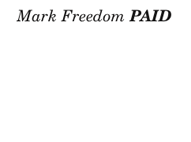 |
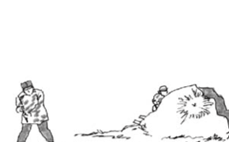 |
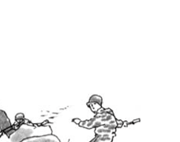 |
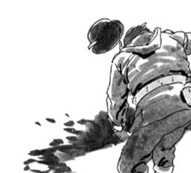 |
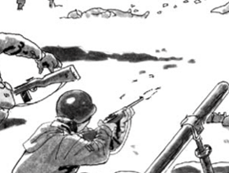 |
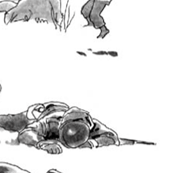 |
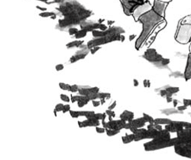 |
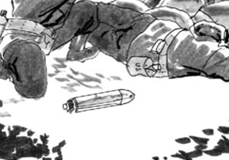 |
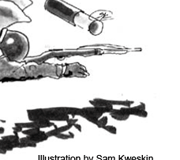 |
 |
 |
 |
Return to the main page for the 83rd Chemical Mortar Battalion.
Return to the home page for chemical mortar battalions.
This Page Was Last Updated: 11-Jun-2005 14:36
